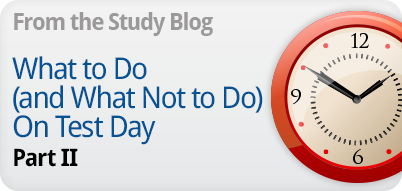
So you’ve done all your pre-test rituals, taken a few deep breaths, and you enter the test venue, feeling pretty confident. Some of those nerves will return as you take your seat, and that doesn’t need to be unsettling: getting a little antsy just means you’re raring to go. But here’re some things you can do to keep those nerves on the useful part of the spectrum.
Warming Up
Do some sample problems just so you can flex your academic chops a little: don’t bother to check your answers since the point of doing this exercise isn’t to get them right or wrong but to focus your mind and make any other distractions dissipate. Another useful trick is to jot down some important things that you might forget and do a quick revision before the test starts.
Stay Confident
You’ve already done all your studying, so now the best thing to do is relax and get everything done as it comes. Keep your posture straight—it’s more important than you think.
Give It Your All
Give each question 100%. It’s hard, but you did the prep, so don’t worry about it. A lot of people only really focus about 60% of their attention on the question they’re working on; the rest is engaged with previous sections of the test, which is useless. You need to channel all your energies to the part you’re working on right then.
Question Your Answers
It’s easy to jump to conclusions and this is true for answering test questions too. This is something you should avoid. Be careful of trap questions. Take a moment and look over your answers. This isn’t a bad time to get paranoid: spent at least 10 seconds on every question making sure you answered it correctly (on most standardized tests, getting a question wrong is much worse than skipping it entirely). Keep double checking your work so you can catch little mistakes that are bound to show up here and there.
Deal With Distractions
Avoid getting distracted! Of course, this is easier said than done. Do your best to ignore all the other people taking the test. People have all kinds of fidgeting habits when they’re thinking and you’ll need to block those out. Being well-prepared is a great way to keep your mind from wandering.
Don’t Give Up!
Keep working until time is called — if you’re done early, double- and triple-check your work.

These suggestions sound very useful. I’d also like to add a couple more ideas that have helped me during tests. When you get stuck at a question that you jbowt you’ve read before but you just can’t remember it, try to go back to that page of your book in your head, or try ro remember where were you when you read that piece of information. It usually gets back to me this way.I hope it works for someone else too!
I still haven’t figured out the most effective way to approach timed case study exams where you have to answer the exam questions based on a 10-15 page case study in an hour and a half (averages from personal experiences). Do you read the questions first and then read the case study keeping those questions in your mind or do you read the case holisitically and comprehensively first while an annotating anything you find interesting? What do you guys think?
I employ most of these tactics. However sometimes I feel that distractions are difficult to avoid. You have to realize you’re human and accommodate those distractions. Could you perhaps elaborate on this more?
I think these tips are useful. However, being nervous during an exam is normal. It’s human nature and no matter how much we try to fight it, it will be there. Deep breathing before the exam and reassurance that you have done your best while preparation and will give your best shot while attempting the exam can help you to deal with nervousness before exams.